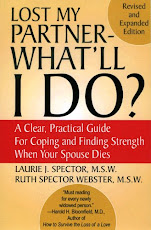
If your late partner used to handle household repairs, you may feel clueless about coping with these situations.
You may choose to learn new skills yourself or get assistance such as:
1) Asking a trusted relative, friend or neighbor for referrals.
2) Joining an online referral service like
Angie’s List.
CAUTION: Hiring anyone who leaves flyers or is just a listing in local newspapers or a supermarket bulletin board can be risky. With any worker or service person you don’t know, insist on references BEFORE allowing the person into your home. Be certain to contact the references and if possible, check online reviews such as
Yelp.com.
If you do decide to tackle a minor replacement or repair, consider the following:
1) If possible, always bring the part that is broken into the hardware store or service center. This saves time spent trying to otherwise explain the problem to the clerk.
2) There are many helpful online sites that will take you step-by-step through repair processes. Your local library is another good resource of “how to” books.
3) Look into taking a “how to” class at your local home and garden center or community center. Even if you decide to hire someone to do the actual repair, you’ll be a more informed customer, which will help protect against unnecessary and/or costly work.
Remember to take your time and try to be patient with yourself. Think of a skill you already have. How much trial and error occurred before you mastered that one?
In Part 2, we’ll offer some resources to help you acquire new repair skills.




